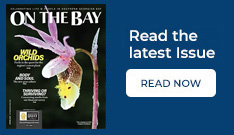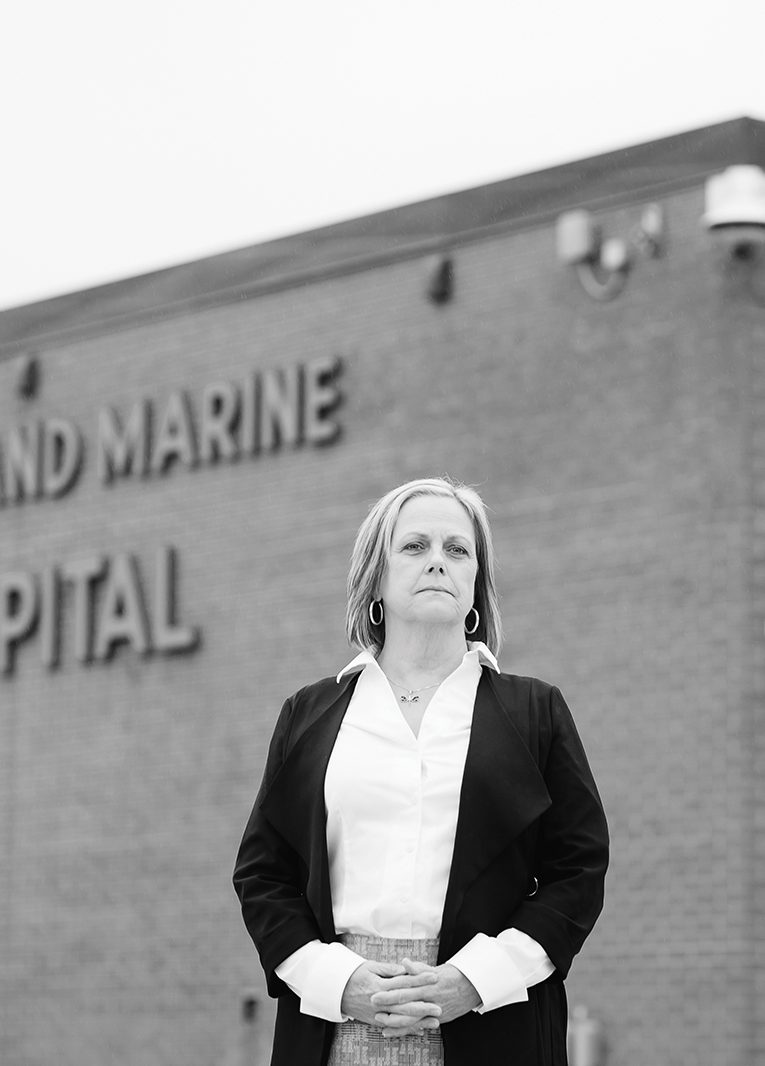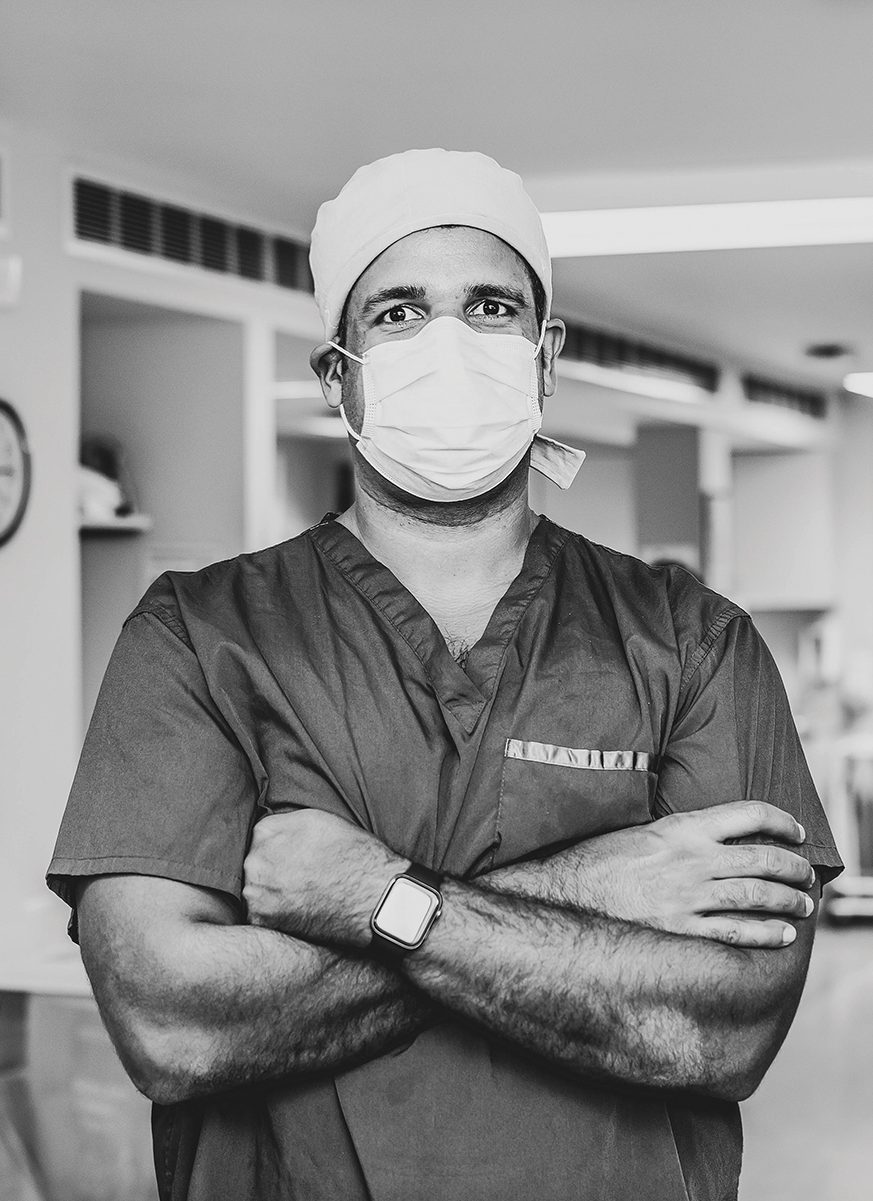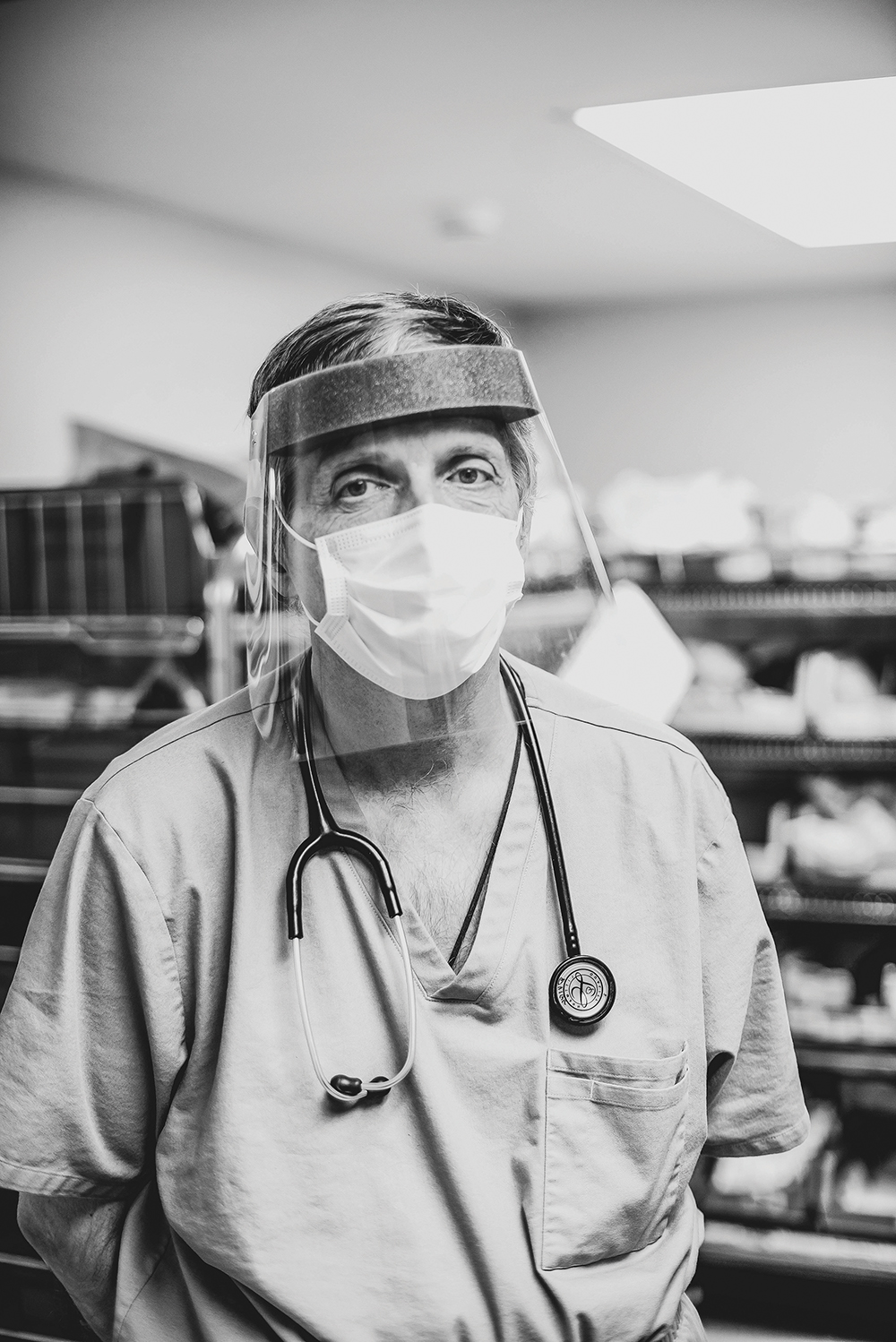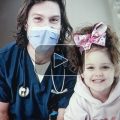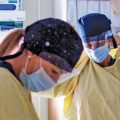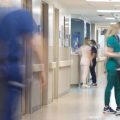Workers at the Collingwood General & Marine Hospital open up about the fear and anxiety of being on the front line during the pandemic, revealing how courage, commitment, resilience and teamwork are keeping us safe and healthy.
Keeping Focused
Norah Holder
President & Chief Executive Officer
When COVID-19 first hit, we initiated Incident Command Response to oversee our COVID response and required actions. This resulted in unprecedented change, innovation, adaptability and teamwork throughout the entire hospital, which has never stopped since March 2020.
Our greatest challenge was a seriously outdated hospital physical infrastructure. The age of the hospital and very limited space have resulted in a phenomenal amount of effort and work that has been undertaken to meet current and emerging best practices that are needed as a result of COVID.
Keeping focused, remaining calm and staying resilient have been essential to reframe both strategy and operations during a pandemic. This requires being anticipatory and innovative with multiple short timeframes, developing scenarios and then Plan A, B, C and D each and every day as well as understanding these may indeed change a number of times a day and being open to that possibility. Most of all, being open to the pandemic represented a tremendous opportunity for those of us in health care to reflect, grow and develop as leaders, including myself.
I am most proud of the unwavering dedication and commitment to patients and the community. Many long hours have and continue to be logged to ensure the required equipment, PPE, space, IPAC (infection prevention & control) best practices and so much more, are in place to provide care safely and to ensure the best quality of care possible during a time of great uncertainty. It has required an ongoing razor-sharp focus and being on and available 24/7. I must say that the stellar CGMH culture of innovation and engagement has been foundational to our success and will be as we continue to move forward.
In March, obtaining PPE for employees and physicians was very challenging. I recall driving home late one night in early April, extremely worried about where we were going to obtain masks and gowns that were essential to keep employees, physicians, patients and our community safe. I lay awake that night thinking about how to get through this challenge. I reflected intensely upon my ultimate accountability and responsibility for the safety of so many. I knew that it would require our entire team to find innovative solutions. The next day, I encouraged our team to think outside the box and we came up with the idea of recruiting community volunteers to sew re-usable, washable and waterproof gowns. We obtained masks from partner hospitals that helped us until we secured and received masks from vendors. It was a very stressful time, but our teamwork, caring and innovation were key success factors.
As CEO of CGMH during this unprecedented time, developing, maintaining, sustaining and growing partnerships, relationships and collaborating with the overall goal of keeping our South Georgian Bay and Simcoe County/Muskoka communities as well as the province of Ontario safe and healthy is essential. No one person and not one organization can move through this COVID journey alone. It will continue to require the collaboration and combined efforts of everyone to successfully get through and address this pandemic.
I am so grateful and honoured to work with such an amazing organization. Our people at CGMH have had to make so many changes. I understand everyone is tired. Yet through it all, our people come to work each and every day and care so deeply for patients and for our community. They are my heroes: CGMH physicians and employees. I am also thankful to the entire Southern Georgian Bay community; their continued support of the hospital and stellar engagement in the required public health measures to keep patients, families, loved ones, friends, co-workers, neighbours, etc. safe and healthy is deeply appreciated and inspiring.
CGMH is here for South Georgian Bay and we are so thankful that South Georgian Bay is here for CGMH. We are stronger together.

Through it all, our people come to work each and every day and care so deeply for patients and for our community. They are my heroes.
Being Prepared
Dr. Jesse Guscott
Simulation Team Lead
Even before COVID-19 arrived in Canada, our simulation team identified the fact that a very sick patient with COVID-19 presenting to our hospital would require challenging medical interventions with the added complexity of risk of infection to staff and other patients. We felt we needed to simulate the case to figure out how and where we would be best able to care for such patients. At the time we thought we were practicing for a theoretical scenario, not expecting that we would ever actually have to implement our approach.
After simulating the scenario a number of times, we produced a document to offer guidance to our care providers and also shared the document with rural health care providers around the country. At this point it became clear that we would actually have to implement our protocols. We continued to develop simulations for all types of COVID-related medical crises in all kinds of hospital locations.
As a novel type of infection, the biggest challenge has been uncertainty around optimal clinical care and infection control practices. In the early days, the science of COVID-19 seemed to be evolving almost daily. The scientific literature was filled with publications from China and Italy offering observations from their early experience. Trying to consolidate all of this literature with ever-evolving policy and guidance documents from the province and the region was a challenge. Putting all of that literature together into a coherent plan that made sense given our local resources became our priority.
My overriding philosophy has been to exercise humility and flexibility while drawing from what we know from the scientific literature combined with our other clinical experiences. In my previous educational endeavours, I often felt I had the knowledge and experience to confidently share my opinions about how to optimally manage certain clinical scenarios. COVID-19 has been humbling in that none of us really knew what optimal management would look like. I’ve tried to stay flexible and adapt so we can learn and get better.
The early days of COVID-19 were truly scary for frontline health care workers. We feared for our safety and the safety of our families should we contract the virus during high-risk clinical care like resuscitations or putting breathing tubes into patients whose lungs were failing. I think that our simulation program gave healthcare workers the opportunity to learn and practice these high-risk scenarios, which helped people to feel safer and more confident in their work. I also think we were able to establish the ability to provide a very high standard of care for sick patients requiring resuscitation and critical care.
Relying on Each Other
Dr. Mark Quigg
Infection Control Lead
Every department of the entire hospital came together, brainstorming and working around the clock to try and get the hospital ready for when COVID hit. With standards of care sometimes changing daily as new information came out of China, Italy and New York, it was a huge challenge.
Trying to get a rural hospital with limited resources and an old, inadequate physical plant ready to deal with a 100-year pandemic, with medical standards of care changing at one point literally every 24 hours, has been the greatest challenge of all our careers.
In a pandemic with large numbers of sick patients presenting in multiple places at once, you can’t expect a lot of help from elsewhere, like in the old Westerns, that “the cavalry will come riding over the hill.” You have to rely on your local resources. That is why I am very glad I am at the G & M because I can’t think of a better hospital or a better community to be in during this. I know we can all count on each other.
The only effective response to a pandemic is a community response. We in health care play a very public role, but without all our fellow frontline workers, the first responders, truckers, grocery store workers, etc. – supported by the entire community following the public health rules – we never would have made it through the first wave.
I am so proud of the G & M hospital staff and the community we all live in. I distinctly remember in the spring at the darkest part of the first wave when we put out a call for help to our community in obtaining PPE. A week later I walked into what had been an empty room now piled to the ceiling with donated masks, gowns and gloves, all the result of local people working round the clock to obtain PPE from all over the world.
It is that same spirit that will get us through the “second wave” which will possibly be the worst part of the pandemic. If we all follow the public health rules, we can get through this with minimal illness and loss of life. I can’t think of any other community I would rather face the second wave with. We will rise to the challenge!

The pandemic has emphasized the need to learn to better tolerate, even embrace, times of uncertainty in life, and to focus on those things that are within our control.
Embracing Uncertainty
Crystal Bell
Manager, Mental Health Services
When the pandemic began in March … our Mental Health Team was advised to cease all non-urgent in person contact by the government. Our team of mental health therapists in our Outpatient Clinic knew that we needed to continue to serve and provide care for fear of worsening symptoms in those living with mental illness, and worry about individuals who may become impacted by the pandemic needing support for the first time. We adapted from in-person therapy to virtual therapy, and the patients we served adapted well to this new delivery of service.
We also were concerned about our own team at CGMH, as we know that one in five individuals live with mental illness, and one in two will be impacted by a mental illness before the age of 40. Our amazing team of therapists stepped into action, developing online resources for our health care professionals to help with anything from coping with our collective trauma of the pandemic, sleep hygiene, managing self care, grief and loss, grounding techniques, healthy vs. unhealthy coping, and the list goes on. We also asked that these resources be posted on our CGMH web page under our Mental Health Program for the community to access.
Our team would check in with our healthcare workers, offering support and resources to ensure we could stay well during unprecedented times, knowing our community is counting on us to be there for them.
The pandemic has emphasized the need to learn to better tolerate, even embrace, times of uncertainty in life, and to focus on those things that are within our control. This overriding philosophy will help us to relieve anxiety and stress levels and allow us to focus on our self care.
It was important for me to early on stress the importance of self care to anyone I came in to contact with. It is the act of being deliberate about our own emotional, mental and physical health and that if we were all going to work through this collective trauma of the pandemic, we needed to work on a balanced response.
The Mental Health team was quick to act and adapt to the pandemic response. It was their time to rise and demonstrate the important work they do each day in health care. They took initiative and were willing to support and care for not only patients, but each other and our entire CGMH team.
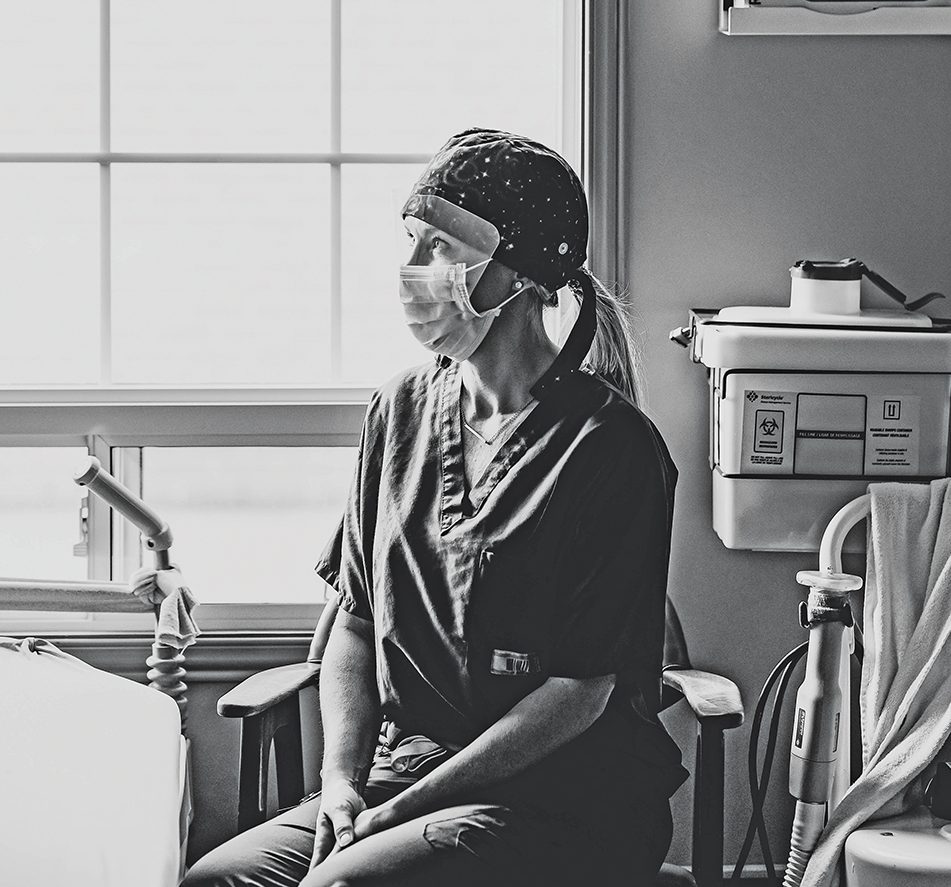

Our team showed up daily to the front line, despite the unknown challenges before them. They continued to provide patient care with dedication and professionalism.
Finding Courage
Aeryn Wilson, RN
Emergency Department Nurse
In the beginning we were seeing terrible situations in hospitals around the world. The concern for appropriate PPE and not having enough of it was my biggest fear. Many of us were anxious. We wanted to know we were best protected to keep ourselves, our patients and families safe.
There was immense fear of what was to come as we watched nightmare situations unfold in hospitals around the world. Our team showed up daily to the front line, despite the unknown challenges before them. They continued to provide patient care with dedication and professionalism.
We may be a small hospital, but our Emerg team doesn’t let that stop them. Our team works really hard to get patients the best care in a timely manner. Despite all the challenges the pandemic has posed, professionally and personally, the team’s hard work and dedication to our patients has not changed.
Managing Change
Patti Grossman, RN
Resource Nurse, Medical Floor
The medical floor was one of the chosen units to accept the COVID-positive patients as well as those waiting for test results. It was scary and overwhelming, to say the least. All admitted patients were sent to the medical floor and we were known as the ‘yellow floor.’ This isolated us from other departments and we were able to maintain a decreased amount of exposure to the rest of the facility.
Our workload can be difficult on the best of days; however, it was increased significantly, and trying to follow the standards of practice made it challenging on most days. There were days where our practice was changing in minutes, let alone hours. It brought us doubt, which then brings fear of the unknown. Did we have the right PPE? Things were changing so fast in terms of what to wear to protect us and ensure we were not a host for this virus. Our PPE was getting low and our practices for protection were changing.
The days felt longer than a regular day and exhausting with the PPE and fears of this disease since it was new to everyone. I was so impressed with our teamwork and how each member of our team was adaptive and professional.
The training we received has been instrumental during the pandemic. The tremendous changes the hospital underwent, in addition to the fear of the unknown and personal stressors, were among the top concerns of
peer contacts that reached out to me since the start of the pandemic.
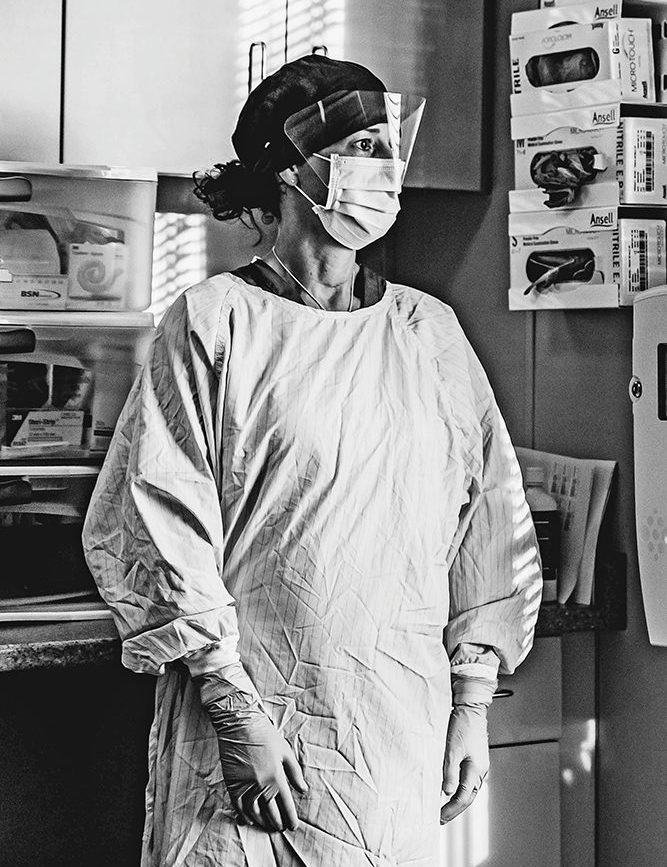

There were days where our practice was changing in minutes, let alone hours. It brought us doubt, which then brings fear of the unknown.

The impact on health care from COVID-19 will forever change the demands and operations in the future.
Remaining Calm
John Widdis
Manager, Facilities Management Department
The maintenance team was tasked with multiple projects simultaneously. Balancing all the multiple demands as a small team, we planned, designed and installed measures to help protect patients and staff. Everyone adapted and worked long hours to meet the challenges, even when they changed midcourse as more information came out about COVID-19, all the while maintaining CSA and other standards protecting patients and staff.
The need to separate our emergency department trauma bays and create barriers to protect staff and patients was just one example. All the while the department had to be able to function if a trauma case presented.
The challenge has been to remain calm and be prepared for changes and the increased demands of day-to-day operations and challenges.
Communication with the team is ongoing. How the team adapted to the challenges, and the dedication to patients and staff, have been a huge source of pride. They worked long hours and always presented a cheerful outlook, even with the increased load beyond day-to-day operations.
The impact on health care from COVID-19 will forever change the demands and operations in the future. Not only will I have to look after the day-to-day operations; the role will need to stay focused on new technology and lessons learned from my counterparts in other facilities.
All the departments had tremendous demands placed upon them and rose to meet them. I would like to say thank you to all my coworkers, as everyone faced this challenge with their own thoughts and concerns, yet always provided the highest level of patient care.
